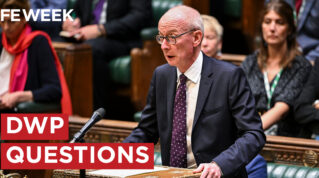There was a distinct ‘Back to the Future’ feel to the spending review, writes Luke Sibieta
This week’s spending review had been trailed as representing a “skills revolution.”
It included an increase of £1.6 billion in funding for 16-19 year olds. Meanwhile, Rishi Sunak promised that spending on skills will increase by £3.8 billion by 2024-25.
But how far does this spending go in rolling back the large cuts seen over the previous decade? And in meeting future challenges?
‘Only reverses a third of college cuts’
The extra £1.6 billion for 16-19 education represents a 17 per cent real-terms increase in total funding between 2021-22 and 2024-25.
But once you factor in the expected growth of 10 per cent in student numbers over this period, this only becomes a six per cent real-terms increase in spending per student.
This is an improvement compared with the 15 per cent real-terms cuts in spending per student for colleges between 2010-11 and 2021-22, and even larger cuts of 28 per cent for school sixth forms.
But because of the depth of those cuts, the extra £1.6 billion only reverses about one third of past cuts for colleges. And in school sixth forms, the money only reverses 20 per cent of past cuts.
The £1.6 billion is also intended to deliver greater numbers of teaching hours as part of the shift to T-levels.
So it’s likely that more of the money will go to further education colleges than sixth forms.
‘Only reverses a third of adult education cuts’
At the 2019 general election, the Conservatives committed to a national skills fund of £2.5 billion over this parliament.
Since then, the government has announced various allocations from this fund.
This includes funding for first full level 3 qualifications for adults in some subjects and other priorities, such as digital bootcamps.
In the spending review yesterday, the government announced an extra £550 million from this existing fund for 2024-25.
This means a 30 per cent real-terms increase in adult education funding between 2019-20 and 2024-25. This sounds substantial.
But it is also a measure of just how far it has fallen over the previous decade.
Between 2009-10 and 2019-20, total spending on adult education fell by 50 per cent in real-terms.
So the £550 million increase between 2019-20 and 2024-25 will only reverse about one third of the cuts to adult education over the last decade.
‘Challenge to delivering funding on apprenticeships’
On top of this, the government announced an extra £170 million for apprenticeship funding, taking total funding for apprenticeships to £2.7 billion by 2024-25.
But delivery of this extra funding could be challenging. During the pandemic, the number of apprenticeships fell due to economic uncertainty and the challenges of social distancing. It is not clear how quickly demand and supply of apprenticeships will recover.
‘A reminder that education is devolved…’
As well as increasing spending on existing skills programme, the government also announced a new UK-wide programme to improve numeracy skills called ‘Multiply’.
In all, £560 million or about £190 million per year for the next three years will be spent on Multiply over the course of the parliament.
This is reminiscent of previous basic skills programmes. It is also quite curious because it is UK-wide, and education is a devolved matter.
‘A return to some former policies’
Finally, the government plans include £2.8 billion of capital spending over the next three years. This includes existing plans of £1.5 billion to improve the college estate up to 2025-26, as set out in the 2020 spending review.
Finally, and interestingly, there is also a return to full funding for first level 3 qualifications for adults (in some subjects) and to funding for basic skills.
In this sense, there is a distinct ‘Back to Future’ feel to this spending review.
All things considered, the Spending Review certainly represents a change of pace for spending on further education and skills.
Total planned spending on further education and skills, including both day-to-day and capital spending, will increase by £3.8 billion between 2019-20 and 2024-25 in cash-terms.
But the increases only go part of the way to reversing past cuts to spending per student in 16-19 education and to adult education.
















Your thoughts